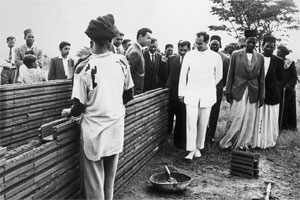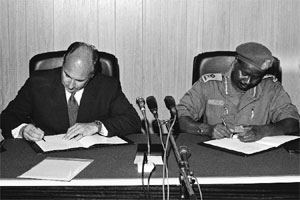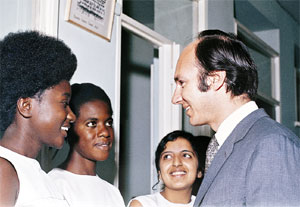
GOOD WORK: His Highness (white garb) inspects construction works at Kibuli Muslim Boys School. The Aga Khan has devoted the bulk of his life to supporting the developing world by establishing social and economic institutions.
Posted by ismailimail in Aga Khan IV, Jubilee, Africa, Media. trackback
The Monitor (Kampala)-COLUMN
11 July 2007
Posted to the web 10 July 2007
http://ismailimail.wordpress.com/2007/07/10/uganda-celebrating-50-years-under-his-highness-karim-aga-khan/#more-1353
Today marks the 50th Anniversary, the Golden Jubilee of His Highness the Aga Khan’s ascension to his role as Imam of the Shia Imami Ismaili Muslims. Half a century ago, he was appointed as the next in the lineage directly from Prophet Mohamed, to lead the Ismaili community.

GOOD WORK: His Highness (white garb) inspects construction works at Kibuli Muslim Boys School. The Aga Khan has devoted the bulk of his life to supporting the developing world by establishing social and economic institutions.
It is a momentous day for the Aga Khan, and the global Ismaili community, as it provides an opportunity to examine who the Aga Khan is, as well as attempt to understand the tremendous role he plays in the betterment of the world, and Uganda specifically.


SUPPORTIVE: The Aga Khan with President Milton Obote in 1966. Below, signing a Protocol with President Yoweri Museveni in 1992. Over the years, His Highness has worked with several African leaders in an effort to promote political stability and development. Courtesy photos
On July 11, 1957, the previous Imam of the Ismailis, Sir Sultan Mohamed Shah Aga Khan III passed away. He had cultivated a relationship with Uganda that spanned decades, having laid the foundation for Kibuli Mosque in Kampala in 1936 and encouraged the Ismaili community to invest in the Ugandan economy upon their arrival in East Africa in the late 19th and early 20th centuries.
By the time of his death in 1957, he had established over 200 schools in Africa and Asia, which formed the foundation of the 300-plus network of Aga Khan Schools around the world, including four in Uganda.

PRESTIGIOUS: The Aga Khan during a visit to one of the Aga Khan secondary schools in 1972. Both Muslim and non-Muslim students can enrol in the Aga Khan institutions.
With the passing of his grandfather, Prince Karim Aga Khan, then a 20-year-old student of Islamic History at Harvard, became the leader of a community of millions of Ismaili Muslims.
Culturally diverse, the Ismailis live in more than 25 countries, in South and Central Asia, the Middle East and Sub-Saharan Africa. In recent decades, they have established a substantial presence in Canada, the USA and Western Europe.
Like his grandfather and other Imams before him, the Aga Khan has, since assuming the office of Imamat in 1957, been concerned with the well being of all Muslims, particularly in the face of the challenges of social change. It is clear to all however that the Aga Khan has not only committed his life to contributing to the support and well being of the Muslim world and the Ismaili community, but also to the societies amongst whom they live.
Having studied in Europe and the United States, and devoted the bulk of his life to the developing world, he is a Muslim leader who connects and is intimately familiar with the East and the West, the North and the South and is therefore able to speak with a profoundly global perspective.
The Aga Khan emphasises the view of Islam as a spiritual faith that teaches compassion, tolerance and upholds the dignity of man; a refreshing expression of Islam in a world where the voices of extremism often scream disproportionately loud.
Son of Prince Aly Khan and Princess Tajuddawlah Aly Khan, the Aga Khan was born on December 13, 1936, in Geneva.
Commitment to Africa
He spent his early childhood in Nairobi, Kenya, and then attended Le Rosey School in Switzerland for nine years. He graduated from Harvard University in 1959 with a BA Honors Degree in Islamic history.
In 1957, what Harold MacMillan, the then British Prime Minister aptly termed a “wind of change” was sweeping through Africa. By the early 1960s, most of East and Central Africa, where the majority of the Ismaili population on the continent resided including Tanganyika, Kenya, Uganda, Malagasy, Rwanda, Burundi and Zaire, had attained independence.
Since then, the Aga Khan has seen Africa undergo endless changes in directions and leadership. He has witnessed African countries wander their way through dictatorship and democracy, conflict and silence, success and adversity.
He has engaged with African leaders and leaders of the industrialised world in an endeavour to ensure that the developing world, including Africa and Uganda specifically, is not marginalised and left out of the incredible progress that the planet has seen over the last five decades.
Considered by many as a citizen of the world, the Aga Khan has a special connection to East Africa, having spent his early years in Nairobi, Kenya. In the 50 years since he became the Imam, he has visited Uganda on many occasions, including some of the most historic in this country’s history; he was one of the international leaders participating in the Independence Day ceremonies on 9th October 1962. 10 years later, in 1972, when President Idi Amin expelled Ismailis and other Asians from Uganda, the Aga Khan played a vital role in facilitating the resettlement of displaced Ismailis in Europe and North America.
Today, many members of the Ismaili community have returned to Uganda and become active and integrated participants in the country’s development. The Ugandan Ismaili community is once again a welcome part of the identity of Uganda.
Ismaili Imamat in History
The Ismaili community has had a long, illustrious history spanning several centuries, during which the Ismaili Imamat made contributions to the growth of Islamic civilisation.
Al-Azhar University and the Academy of Science, Dar al-Ilm, in Cairo and indeed the city of Cairo itself, exemplify their contributions to the cultural, religious and intellectual life of Muslims.
Among the renowned philosophers, jurists, physicians, mathematicians, astronomers and scientists of the past who flourished under the patronage of Ismaili Imams are Qadi al-Numan, al-Kirmani, Ibn al-Haytham (al-Hazen), Nasir e-Khusraw and Nasir al-Din Tusi. Clearly, the Institution of the Ismaili Imamat demonstrated great capacity in the past, and through His Highness the Aga Khan continues to do so today.
In recent generations, the Aga Khan’s family has followed a tradition of service in international affairs.
The Aga Khan’s grandfather was President of the League of Nations and his father, Prince Aly Khan, was Pakistan’s Ambassador to the United Nations. His uncle, Prince Sadruddin Aga Khan, has been United Nations’ High Commissioner for Refugees, United Nations’ Coordinator for assistance to Afghanistan and United Nations’ Executive Delegate of the Iraq-Turkey border areas.
The Aga Khan’s brother, Prince Amyn, entered the United Nations Secretariat, Department of Economic and Social Affairs following his graduation from Harvard in 1965.
Since 1968, Prince Amyn has been closely involved with the governance of the principal development institutions of the Imamat. The Aga Khan’s eldest child and daughter, Princess Zahra, who graduated from Harvard in 1994 with a BA Honours Degree in Third World Development Studies, has coordination responsibilities relating to specific social development institutions of the Imamat and is based at his Secretariat.
His eldest son, Prince Rahim, who graduated from Brown University (USA) in 1995, has similar responsibilities in respect of the Imamat’s economic development institutions.
His middle son, Prince Hussain, who graduated from Williams College (USA) in 1997, has recently joined the Secretariat and is involved in the cultural activities of the Network. His youngest son, Prince Aly Mohamed is studying in Europe.
The development network
True to the vision of Islam and the tradition of service to humanity, the Imams of the Ismaili Muslims have an elaborate and well-defined institutional framework to carry out social, economic and cultural activities.
Under the Aga Khan’s leadership, this framework has expanded and evolved into the Aga Khan Development Network, a group of institutions working to improve living conditions and opportunities in specific regions of the developing world.
This network of agencies, known as the AKDN, is active in many areas of Asia and Africa improving the quality of life of ordinary people. Currently, the AKDN works in over 30 countries with some of the poorest and most diverse populations in the world. In every country, these institutions work for the common good of all citizens, regardless of their origin or religion.
Their individual mandates range from architecture, education and health, to the promotion of private sector enterprise, the development of civil society and rural development. Uganda has benefited greatly from the Aga Khan Development Network in various sectors. The well respected and long established Aga Khan Schools have made their mark on the education system, but more recently, the luxurious Kampala Serena Hotel has become the most visible of AKDN’s initiatives.
The various projects have an underlying ethic of human development, and when examined closely, clearly demonstrate that the Aga Khan is not about short-term commercial gain, but long-term investment in areas of wide human and societal impact.
Over the years, the Aga Khan has received numerous decorations, honorary degrees, and awards in recognition of the various dimensions of his work. He has received civilian decorations from the governments of France, Portugal, Côte d’Ivoire, Upper Volta, Madagascar, Iran, Pakistan, Italy, Senegal, Morocco, Spain, and Tajikistan. He has been awarded honorary degrees by universities in Pakistan, Canada, the United Kingdom, and the United States.
He has also received numerous awards and prizes from various professional organisations in recognition of his work in architecture and the conservation of historic buildings. The title ‘His Highness’ was granted by Her Majesty the Queen of England in 1957, and ‘His Royal Highness’ by His Imperial Majesty the Shah of Iran in 1959.
His Highness the Aga Khan will make an official visit to Uganda in August 2007 to mark his Golden Jubilee. Amidst the celebrations and fan fare, Uganda and the rest of the world can truly appreciate the accomplishments of 50 years in the life of a remarkable leader.